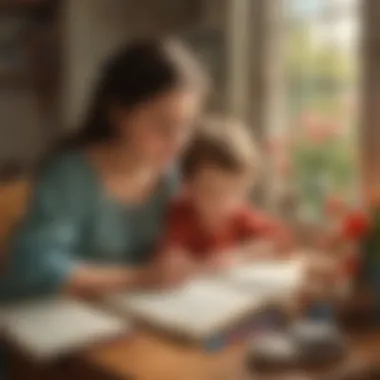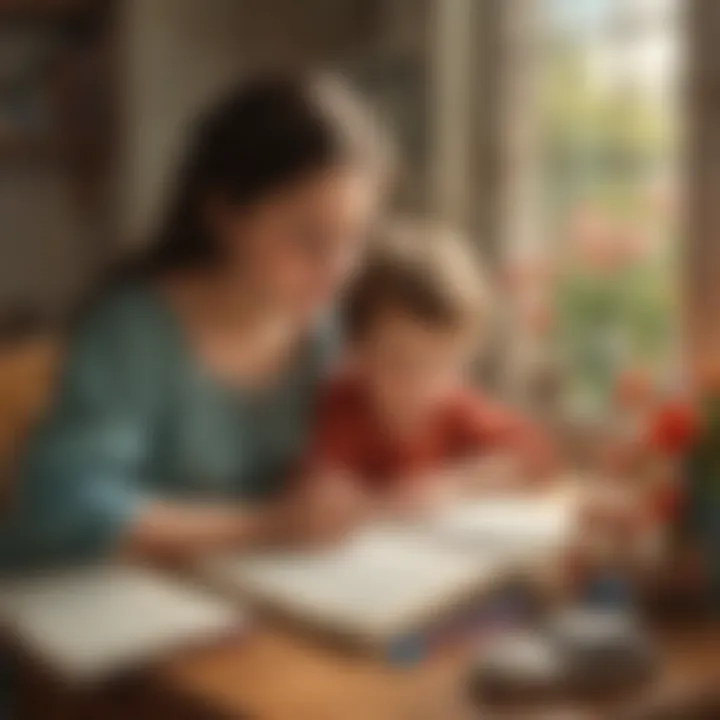A Lovely Poem for Mother: Celebrating Unconditional Love


Intro
The relationship between a mother and her child is one of the most profound connections in human existence. This bond is characterized by a blend of love, strength, and understanding. Exploring this intricate relationship through poetry allows us to express feelings that often remain unspoken. In the context of this article, we examine ways to articulate gratitude, love, and admiration for mothers.
Through the lens of poetry, we aspire to provide children and their caregivers with insights into crafting personalized tributes. The themes of love, sacrifice, and gratitude will form the backbone of our exploration, guiding readers to discover how poetry can be a powerful medium of expression. It unveils layers of emotion, enhancing our appreciation for the unique bond we share with our mothers.
As we proceed, each section builds on the previous one, offering inspiration and a framework for creativity. This combination of ideas not only enriches personal expression but also serves an essential role in relational development, particularly for a child's emotional growth.
Creative Activities
Crafting poetry can be an insightful activity for children. Not only does it enhance their emotional intelligence, but it also provides opportunities for creative exploration. Here are several craft ideas to inspire the creation of personalized poems for mothers.
Craft Ideas
- Memory Collages: Encourage children to gather photos and mementos related to shared experiences with their mothers.
- Poetry Cards: Simple blank cards can serve as the canvas for penned verses throughout the year.
- Decorative Frames: Once a poem is written, providing a colorful frame elevates its presentation.
Step-by-Step Guides
- Choosing the Theme: Start by discussing different themes young poets might want to explore.
- Brainstorming Content: Use activities like drawing or word association to help children develop ideas.
- Write Together: Sit with your child to draft their poem. Encourage them to voice their feelings in a structured format.
- Finalize and Decorate: Help them finalize their piece, adding decorations or illustrations that complement their work.
Educational Value
Engaging in such activities enhances not just artistic skills but also critical thinking and emotional vocabulary. The process of writing poetry helps children articulate feelings that they may find difficult to express otherwise. This art form can also cultivate empathy as children reflect on their personal experiences with their mothers.
Moreover, poetry writing can foster familial bonds, promoting communication and discussion on topics of love and appreciation. A simple creation can lead to deeper conversations, making poetry a conduit for emotional education. Gardening introduces children to nature, healing and nurturing seeds, much like expressing emotions leads to reaping the fruits of understanding truly.
Understanding the Maternal Bond
The maternal bond is a central theme in poetry dedicated to mothers. This significance arises from how it influences not just individual relationships, but also the wider aspects of human connection. Understanding this bond allows us to express complex emotions in simple yet profound ways. To write a lovely poem about a mother, one must appreciate the history and psychology behind this relationship.
Historical Context of Motherhood
Historically, motherhood is celebrated across cultures in unique narratives. Different societies assign multiple roles to mothers, from nurturing caretakers to formidable matriarchs. In ancient texts and myths, mothers often symbolize life and sustenance. Many artworks and poetic masterpieces depict mothers engaged in profound acts of love and sacrifice. Recognizing these contexts deepens the understanding of emotional themes represented in poetry. By studying historical representations of motherhood, we can craft poems that resonate strongly with audiences, offering a reflection of timeless maternal virtues.
Psychological Perspectives on Mother-Child Relationships
Psychology provides valuable insight into mother-child interactions. Feelings of security, warmth, and attachment are crucial elements of these relationships. Early attachments formed during childhood mold the individual’s emotional landscapes and future relationships. According to research, a positive maternal bond can enhance emotional intelligence, overall happiness, and social skills in children. Crafting poetry that resonates with these psychological elements can make a personal tribute remarkably profound. Poems can represent the appreciation children hold for their mothers’ sacrifices, declarations, and life lessons.
"Understanding the psychological roots of maternal connections allows us to invoke deeper emotions in poetry."
Exploring the complexities of this relationship can greatly enhance one's ability to recognize and convey the unique influence a mother has on her child's life. By amalgamating both the historical and psychological insights, poets can encapsulate the essence of the maternal bond effectively and meaningfully.
The Role of Poetry in Evoking Emotions
Poetry plays a significant role when expressing emotions, especially regarding the maternal bond. Its rhythms and lyricisms allow for the expression of deep sentiments that often exceed the capacity of ordinary language. In this context, the article highlights the different dimensions where poetry can facilitate the outpouring of feelings.
The strength of poetry lies in its ability to condense feelings into clear images when speaking about the nuances of love, sacrifice, and gratitude. In relation to a mother, the subtleties of everyday life can found in poetic lines, transforming mere words into heart-felt messages. Poetry frequently serves as the canvas where personal experiences coalesce into art. This transformation nurtures feelings of connection and will be greatly discussed throughout this article.
Poetry as a Medium for Expression
Poetry serves as a unique medium for self-expression. Unlike prose, it often combines succinct language with rhythm, allowing for a layering of meaning and a range of emotions. This is particularly valuable in honoring mothers. The simplicity of language textures can relay profound concepts in an easily digestible format. Writing a poem for a mother transcends mere sentiments of appreciation; it becomes a finely crafted affirmation of loyalty and admiration.
When one considers the emotions felt in childhood, there is an urgency to convey love, hope, and appreciation articulated towards a maternal figure. Writing allows individuals to dive into these emotions more purely. Often, the treasures of memories arise more easily when shrouded in poetic language. As children reminisce about moments both grand and mundane, those memories take on vivid shapes crafted by their very words.


The Impact of Words in Poetry
The power of words in poetry cannot be overemphasized. Specific choices in terms can evoke tangible consequences in terms of emotional titans for readers or recipients. The right words can build bridges between generations while preserving the essence of personal and heartfelt experiences.
Interestingly, poetry also inhabits a realm where rhythm and sound boost feelings. Rhyme and meter add to emotional layers of a piece. In this way, verses speak intimately. The reader may feel more than what the text describes. The
Themes Commonly Found in Poems for Mothers
Understanding the themes commonly found in poems dedicated to mothers is crucial in crafting a meaningful tribute. These themes capture the essence of the maternal bond. By touching upon sentiments, poets convey deep emotions, offering readers a shared understanding of this unique relationship. Each theme serves as a lens to reflect experiences and appreciation.
Expressions of Love and Affection
One of the core themes in poems for mothers is love and affection. This theme often highlights the powerful connection that exists between a child and their mother. The words used can evoke warmth and gratitude, resonating with readers of various ages. Lines that convey love remind us of cherished moments, like bedtime stories or warm hugs.
A well-crafted poem can encapsulate feelings which may often go unexpressed. Examples of phrases might include descriptions of everyday interactions that signify unconditional love. Communicating such sentiments via poetry creates an emotional bond. It emphasizes that love can take many forms—through actions, words, and even unspoken rituals that connect mothers and children.
Recognition of Sacrifice
Sacrifice is another theme prevalent in poems for mothers. Recognizing the content of sacrifices made by mothers renders a profound respect and admiration. Many mothers choose to put their children's needs ahead of their own. This includes time, energy, and aspirations. A poem reflecting on these sacrifices can make a significant emotional impact.
Highlighting sacrifices transforms recognition into appreciation. Effective lines may draw attention to late nights spent comforting a sick child. Others might reference difficult decisions made to ensure a brighter future. When poets acknowledge such sacrifices, they bring an important dimension to the maternal relationship. Further, this recognition fosters a stronger bond, ensuring that both writer and reader understand the selfless nature of a mother’s love.
Celebration of Wisdom and Guidance
Celebrating a mother's wisdom and guidance enriches poetic narrative. Mothers offer lifelong lessons that shape a child’s character and help to define their identity. This theme encapsulates everything from teachings about basic life skills to love and resilience in the face of difficulties.
Wisdom encapsulated in a poem often reflects past experiences and shared stories. Sentences may describe how a mother’s advice helped navigate challenges. Overall, using this theme presents a way to honor their foresight and nurturing ability. Such tributes show clear admiration for how maternal figures influence the life's course of their children.
A thoughtful poem honoring a mother touches on the threads of love, sacrifice, and wisdom, weaving them together to create a powerful testament of appreciation and gratitude.
By contemplating these common themes, readers can better understand the breadth of emotions they might want to express when writing a poem for their mothers. Each theme enriches the narrative and enhances the reader's emotional engagement.
Crafting a Lovely Poem for Mother
Crafting a poem dedicated to one's mother is a profound act that signifies an expression of love and gratitude. It provides a unique platform to articulate personal feelings actual and imaginative bonds. Writing a poem can deepen relationships between mothers and their children. Through the pages of poetry, one can pay homage to the unwavering support and unconditional love of a mother.
Choosing the Right Words
Choosing the right words is a crucial step when writing a poem for Mother's Day. Language can convey emotions—from joy to sorrow. Opting for specific vocabulary connects deeper to a mother’s heart. Focus on words that resonate closely with personal feelings. Terms like “love,” “sacrifice,” and “support” highlight the notable traits of motherhood.
Furthermore, think about terms that relate to your personal experiences. Are there phrases that remind you of your childhood? Incorporating those touches can create warmth in your writing. Words also set the tone of the poem. Decide whether you wish it to be joyful and celebratory or reflective and tender; this will guide your word choice.
Finding the Right Structure
The structure of a poem can shape its delivery. A clear and cohesive form enhances readability and emotional impact. Rhymed verses can give a musical feel, while free verse allows freedom for self-expresion.
When exploring different structures, think about where the description and emotions will best unfold.
- Consider a sonnet for its classic and neat outline.
- Utilize a haiku to deliver simple yet thoughtful moments.
- Reflect in free verse, focusing on your heart’s intent, regardless of pattern or rhythm.
Each structure has its own appeal; the best choice often reflects the intentions behind your words.
Incorporating Personal Experiences
Personal experiences are the heart of any sincere poem. These elements breathe life into the words. Share moments that shaped your bond with your mother—an event that made you feel truly loved or supported. Think of recurring themes during childhood, lessons learned, and nurturing moments.


- Insert specific anecdotes. For example, a quiet night spent reading or lessons while cooking together.
- Reflect on attributes that made your mother unique. Was she a source of strength or a guide through life challenges?
Inclusion of these elements makes your poem genuine. Such details might evoke shared laughter or fond memories, fostering a sense of togetherness through the words.
Crafting a heartfelt tribute is an art. It translates love and appreciation into verse, immortalizing sentiments on paper.
Exploring Different Poetic Forms
Poetry serves as a beautiful yet potent method in capturing the essence of feelings, notably love towards one’s mother. This is where different poetic forms come into play. Exploring diverse poetic styles is fundamental in tailoring a poem that resonates deeply and authentically, allowing the sender to express unique sentiments effectively.
Rhymed Verses
Rhymed verses are structured and rhythmic, creating music on the ears of those who listen. They often follow a specific pattern that can enhance the emotional delivery of a poem. The predictability in rhyme can also comfort readers and listeners, providing a sense of familiarity with emotional messages. Choosing to write in rhymed verses offers you the following benefits:
- Memorability: Rhymes often stick with us. A poem that has a well-chosen rhyme scheme can linger in the hearts and minds of listeners long after they hear it.
- Nostalgia: Often, children first hear rhymes in nursery rhymes or bedtime stories. Using this form can evoke feelings of warmth and childhood memories, adding depth to your tribute.
- Musical Quality: The rhythm of a rhymed verse can make the recitation almost musical, inviting listeners to engage with the content more thoroughly.
When crafting your rhymed poem, pay attention to the emotion behind each word. Find inspiring words that align with your theme of maternal love.
Free Verse
In contrast to the rigidity of rhymed verses, free verse champions flexibility. It allows for a more personal and unrestricted expression. Writers like Walt Whitman and Allen Ginsberg employed free verse, which lends itself well to profound emotions and nuanced feelings. Here are some vital aspects of free verse:
- Freedom of Expression: You can express ideas without binding them to a structure, allowing deeper reflections and emotions to unfold.
- Innovation: It allows for creativity in phrasing, pauses, and imagery. This can showcase unique relationships and experiences between a mother and child, making the poem raw and deeply personal.
- Dynamic Flow: Free verse enables a natural flow of thoughts. Words can pour out as they arise in intuition, resonating honesty.
Engaging in free verse means that each poem can be completely individual. Focus on the feelings and experiences that shape the love for your mother.
Haiku and Other Short Forms
Short forms of poetry, such as haikus or other styles, present an interesting way to encapsulate feelings in fewer words. A typical haiku structure consists of three lines with a syllable pattern of 5-7-5. This brevity forces the writer to condense their emotions succinctly. Consider the following:
- Clarity: Short forms strike straight to the point, leaving little room for unnecessary language. They can effectively highlight significant emotions or moments beautifully.
- Impact: The best haikus often provide profound insights within a few words. A poem may leave a lasting impression due to its simplicity.
- Creativity Challenge: Writing in a concise format can be challenging, which promotes thoughtfulness about word choice and arrangement. It can lead to fresh perspectives in your writing.
In presenting feelings towards your mother, a haiku or short poem may capture moments like a hug's warmth or the scent of her cooking, reminding you of comforting home.
Breadth of poetic expression in its many shapes not only captures but also amplifies the sanctity of maternal love. Its varieties offer routes to touch the soul.
Developing familiarity with these poetic forms empowers you to craft a meaningful tribute. Experimenting with your gift of expression unveils new possibilities for showcasing your bond of unconditional love with your mother.
Presentation and Delivery of the Poem
The manner in which a poem is presented and delivered can significantly enhance the emotional impact it has on the listener. The process of sharing your poem with your mother transforms simple words into a heartfelt moment of connection. It is not just about the content; it is equally about how that content is expressed. By considering various factors when presenting a poem, you can elevate the overall experience.
Here are a few essential elements to bear in mind:
- The setting where the poem is read.
- The emotional tone of the delivery.
- The choice between handwritten and typed formats.
A thoughtful presentation deepens the significance of your heartfelt tribute. It shows the mother your effort. It makes her value the moment. Thus, careful attention to these aspects is crucial.
Handwritten vs.
Typed Formats
Choosing between a handwritten or typed format involves a decision about intimacy versus legibility. Handwriting your poem adds a personal touch. It communicates warmth and can evoke a sense of nostalgia. This approach allows you to express individuality through your penmanship. Each handwritten stroke is its own item of art, signifying effort and emotion.
On the other hand, typing can ensure clarity and professionalism. A typed poem looks neat. It may serve better if the poem is lengthy or complex. Regardless, it might lack some of the emotional weight a handwritten piece carries.


Consider these points:
- Personal Touch: Handwritten is more intimate.
- Legibility: Typed offers clarity.
- Ease of Editing: Typed can be easier to change or revise.
A possible compromise: Use handwriting for the poem and type a short note to accompany it.
Timing and Setting for Recitation
The timing and setting for reciting the poem influence its reception significantly. Birds chirping or a soft breeze can provide pleasant background noise or the challenge of adjusting emotions through varying environments. Choose a comfortable space where mother can be relaxed. Ideally, this setting should feel warm and nurturing, possibly at home or a serene outdoor area when nature calms nearby.
Timing is equally important. Select a moment when your mother is not distracted. Perhaps choose an occasion like her birthday or a simple family gathering. This ensures she is in an attentive emotional space to welcome your words. Appropriate timing amplifies the impact you hope to achieve.
To sum it up, the environment helps frame the significance of your presented poem. With thoughtful consideration of presentation formats and a conducive setting for delivery, your tribute will resonate in your mother's heart long after the last word has been spoken.
Sharing the Poem with Mother
Sharing a poem with your mother is a significant act. It allows you to convey emotions that might be difficult to express verbally. A poem serves as a tangible tribute to the maternal bond, encapsulating feelings of love and appreciation in verses. This action creates a bridge of connection that can deepen your relationship. Moreover, it offers an opportunity for mothers to reflect on their role and the impact they have had on their children’s lives. By taking the time to share such a personal piece, you celebrate your shared memories and strengthen emotional ties.
Creating a Special Moment
To maximize the impact of sharing the poem, it is essential to create a special moment. Setting can greatly influence the tone of the sharing. Choose a quiet environment that promotes intimacy. This could be a cozy corner in the living room or during a peaceful walk. Regardless of the location, focus is necessary.
Consider timing as well. Special occasions like Mother’s Day or birthdays offer a unique backdrop. However, a simple everyday moment can be just as meaningful. Once you have decided on the place and time, be genuine in your presentation. Presenting the poem with a sincere attitude can elevate the experience.
Capturing the Reaction
Capturing the reaction of your mother is crucial in this process. Observing her expressions and responses provides insight into the emotional depth of the moment. It can create a lasting memory that you both share. Taking a mental note, or even a quick photograph, after you share your poem helps preserve that feeling.
Additionally, encourage her to express her thoughts about the poem. This could spark insightful conversations about emotion, experiences, or cherished memories related to your shared history. The connection not only showcases her appreciation but can open a dialogue that enrichens your bond as well. Remember, this act is not just about the poem. It is powerful because it builds mutual understanding and fosters love.
The Long-lasting Impact of a Poem
Crafting a poem for a mother transcends the moment of creation. It embodies a way to communicate pieces of emotions that may be hard to express otherwise. Given the nature of the bond between a mother and child, poems can forge connections that linger in memories for years. The impact of such a poem can be profound, especially when it resonates emotionally.
Emotional Resonance
Emotion is the heartbeat of poetry. An effective poem captures feelings in a precise manner. The emotions pulsing through a poem tie directly to experiences shared between mother and child. When a child presents a heartfelt poem, the message conveys not just love but reflection of shared moments.
A poem can draw tears or smiles. It can symbolize joy, worry, and pride—emotions experienced collectively over time. This connection of emotional resonance can establish an unbroken chain linking the past, present, and future. As feelings continue to stir within such a piece, the mother may revisit its words, recalling when and why it was made. That remembrance is a lasting strike on the heart. When words encapsulate shared struggles, mini victories, and quiet joys, the impact is memorable. In every line lies a puzzle piece of the family’s journey together.
Creating a Legacy of Love
Poems serve as a holistic legacy, especially a tribute to a mother. Legacy here means passing on sentiments, tone, and values through generations. Verse written today could become a cherished item in the future. As parents age, the risk of fading memories becomes a concern. A lovely poem offers a tangible expression of love that communicates appreciation clearly and memorably.
Through multiple poetic approaches, these legacies can interweave foundational ideas on care, caregiving, and mutual growth. This versatility in expressing one's relationship builds a rich tapestry of inherited wisdom. The act of writing a poem brings autonomy yet encourages dialogue between generations.
Epilogue
The conclusion of this article brings together essential themes and insights about the bond between mothers and their children. The purpose of writing poems for mothers goes far beyond the choice of words or style. It serves as a profound means to express emotions that are difficult to articulate otherwise. A poem captures the essence of joy, love, and even sorrow that comes with the identity of motherhood. Through verse, feelings are mirrored, and sentiments are born anew.
The Enduring Nature of Maternal Love
The enduring nature of maternal love is an intrinsic part of the human experience. This love forms the foundation upon which relationships are built. Throughout different cultures and ages, the perception of motherhood has evolved. Yet its importance remains constant.
"A mother’s love is the fuel that enables a normal human being to do the impossible."
Here's why this part of the article is vital:
- Understanding Unity: Recognizing the unwavering support that mothers provide creates appreciation.
- Acknowledgment of Hardships: Mothers often undergo trials while caring for their children. Edifying these experiences in poetry shows empathy and respect, connecting us more deeply with our own maternal figures.
- Nurturing Relationships: The act of creating a poem fosters emotional closeness. It encourages conversations and reflections about love and growth.
- Preserving Memories: Poems can be kept as lasting mementos. They remind future generations of the love shared by mothers and their children.
By focusing on the unyielding qualities of maternal love, the reader gains insights into how a simple poem can invoke memories and honest dialogues, underpinning relationships that thrive. In summary, this exploration and expression through verbal art contributes significantly to emotional understanding and connection within families.







